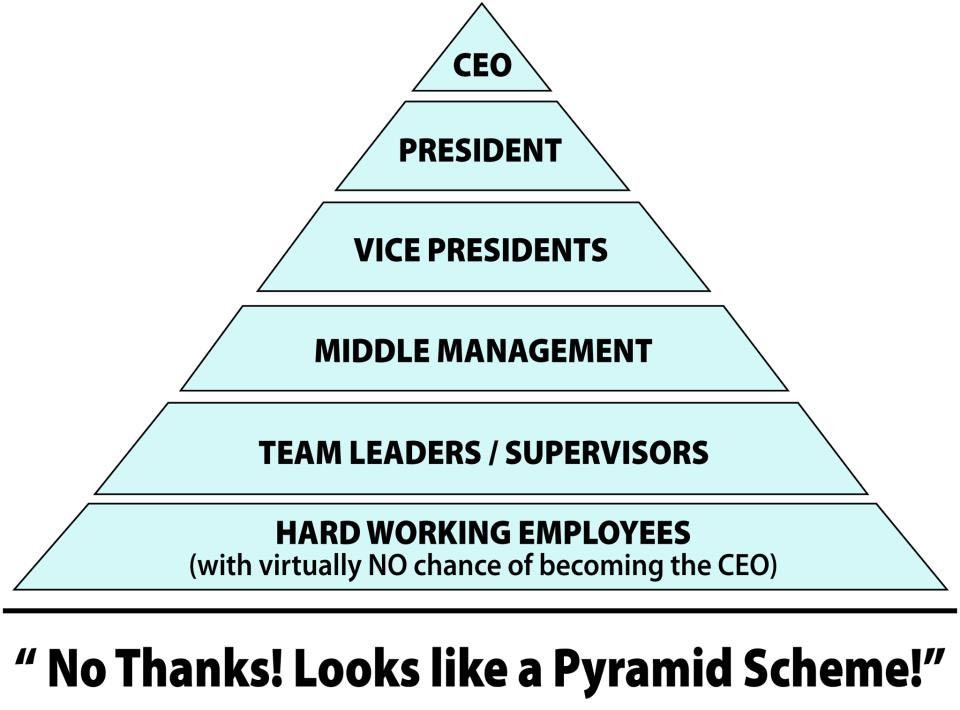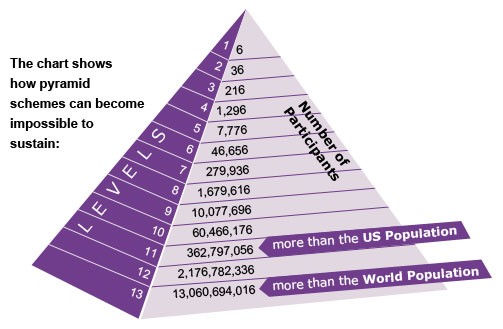Pyramid Schemes
Post on: 11 Июль, 2015 No Comment

The ever-growing popularity of direct selling often motivates dishonest individuals and companies to misrepresent themselves as legitimate direct selling businesses in hopes of enticing victims. Thousands of Americans have lost millions of dollars participating in scams and pyramid schemes. Many victims thought they were paying for help in starting a small business of their own, when in fact they were being fooled by a slick pyramid scheme disguised to look like a legitimate business.
What is a pyramid scheme?
Pyramid schemes are illegal scams in which large numbers of people at the bottom of the pyramid pay money to a few people at the top. Each new participant pays for the chance to advance to the top and profit from payments of others who might join later. For example, to join, you might have to pay anywhere from a small investment to thousands of dollars. In this example, $1,000 buys a position in one of the boxes on the bottom level. $500 of your money goes to the person in the box directly above you, and the other $500 goes to the person at the top of the pyramid, the promoter. If all the boxes on the chart fill up with participants, the promoter will collect $16,000, and you and the others on the bottom level will each be $1,000 poorer. When the promoter has been paid off, his box is removed and the second level becomes the top or payoff level. Only then do the two people on the second level begin to profit. To pay off these two, 32 empty boxes are added at the bottom, and the search for new participants continues.
Each time a level rises to the top, a new level must be added to the bottom, each one twice as large as the one before. If enough new participants join, you and the other 15 players in your level may make it to the top. However, in order for you to collect your payoffs, 512 people would have to be recruited, half of them losing $1,000 each.
Of course, the pyramid may collapse long before you reach the top. In order for everyone in a pyramid scheme to profit, there would have to be a never-ending supply of new participants.
In reality, however, the supply of participants is limited, and each new level of participants has less chance of recruiting others and a greater chance of losing money.
Identifying and avoiding pyramid schemes
Pyramid schemes seek to make money from you (and quickly). Multilevel marketing companies seek to make money with you as you build your business (and theirs) by selling real products and services. Before you sign up with a company, investigate carefully. A good way to begin is to ask yourself these three questions:
How much are you required to pay to become a distributor?
If the startup cost is substantial, be careful! The start-up fee in multilevel companies is generally small (usually for a sales kit sold at or below company cost). These companies want to make it easy and inexpensive for you to start selling. Pyramid schemes, on the other hand, make nearly all of their profit on signing up new recruits. Therefore, the cost to become a distributor is usually high. CAUTION: PYRAMIDS OFTEN DISGUISE ENTRY FEES AS PART OF THE PRICE CHARGED FOR REQUIRED PURCHASES OF TRAINING, COMPUTER SERVICES, PRODUCT INVENTORY, etc. These purchases may not even be expensive or required, but there will be considerable pressure to take full advantage of the opportunity.
Will the company buy back unsold inventory?
IF YOU COULD BE STUCK WITH UNSOLD INVENTORY, BEWARE! Legitimate companies which require inventory purchases will usually buy back unsold products if you decide to quit the business. Some state laws and the DSA Code of Ethics require buy-backs for at least 90% of your original cost.
Are the companys products sold to consumers?
IF THE ANSWER IS NO (OR NOT MANY), STAY AWAY! This is a key element. Multilevel marketing (like other methods of retailing) depends on selling to consumers and establishing a market. This requires quality products, competitively priced. Pyramid schemes, on the other hand, are not concerned with sales to end users of the product. Profits are made on volume sales to new recruits, who buy the products, not because they are useful or attractively priced, but because they must buy them to participate. Inventory purchases should never be more than you can realistically expect to sell or use yourself.
Warning Signs of Fraud
Pressure to sign a contract quickly and agree to pay a large sum of money before sales claims can be investigated or legal advice obtained.
Legitimate opportunities will not disappear overnight. Its OK to be enthusiastic about getting involved in direct selling (and in fact its enthusiasm and a love for what they do that drives any direct sellers) but you should take the amount of time necessary for you to feel 100% comfortable before signing on the dotted line.
Promises of extraordinarily high or guaranteed profits
Its easy to be swayed by promises of a high income, especially if its billed as guaranteed or easy. Scam artists try to take advantage of human vulnerabilities, which is often very easy if someone is in a situation where they need cash fast. Its important to remember that, as in any business model, earning substantial sums of money requires time and attention to building the business. In direct selling, the amount of time required varies based on ones goals and the amount of time one anticipates spending on direct selling activities. It may take a relatively short amount of time to begin earning supplemental income, but if your goal is to rely solely on direct selling, it may take several years before you can quit your 9-5 job.
Exaggerated earnings claims are an unfortunate lure used by scam artists to entice people to join in. Its most unfortunate because it is possible to make a great deal of money in direct selling and those dishonest folks who misrepresent the facts muddy the waters for everyone. Those with unrealistic expectations are the most likely to fail, far before even approaching realization of their goals. Even those accurately represent what THEY make, may still be guilty of making exaggerated claims if they do not follow very specific guidelines for how the information is presented.

Claims that profits can be achieved easily.
Direct selling requires work to sell the products and services. You will not reap profits by just signing up or through the mere act of sponsoring others. Direct selling income must be based primarily on the sale of products and services to consumers who will use those products and services if you are being told this part of the process isnt necessary or is only a sidebar to recruiting, be suspect. Even if you choose to build your business by recruiting others, youll spend time training and mentoring those recruits so they can be successful sellers as well. In other words, dont use your first commission check as a downpayment on a comfy couch where you plan to count your income you need to be actively engaged in your business to truly be successful.
A required initial fee which greatly exceeds the fair market value of any products, kits or training
Any fees you are required to pay to the company should be reasonable based on what you get in return. Its fairly easy to verify this in cases where you spend $69 for a sales kit that includes product samples, a training manual, catalogs and order forms. It becomes more difficult in instances where the fee is substantial ($1000 or more, for example) and you may not get anything in return besides the right to recruit others. Theres no magic number that serves as a dividing line between legitimate and suspect so you need to use your best judgment in evaluating any startup fees.
A large fee payable before you receive anything in return
This is closely related to the previous item. In most cases, you should be able to start selling right away. Just as youre anxious to get the ball rolling, legitimate companies want you to get started selling as soon as possible, too. Be sure to find out exactly what youll receive and when youll receive it before paying any money.
Evasive answers by the salesperson or unwillingness to give disclosure documents required by law.
Sometimes sellers may not know the answers to all the questions you may ask. That alone is not necessarily cause for concern, but a dismissive attitude about your concerns or an unwillingness to find the answers or direct you to someone who can help you should be a red flag. You should read over your salesperson agreement carefully, ask any questions you have and dont be afraid to contact the company directly if you have more questions.
These are only warning signs of the most obvious frauds. An independent investigation is necessary in any case. A fraudulent salesperson may be prepared with glib assurances and authentic-looking documents. Remember, if its worth your money, its worth your time to investigate.
What is the difference between a pyramid scheme and direct selling?
Pyramid schemes seek to make money from you (and quickly). Direct selling companies seek to make money with you as you build your business (and theirs) selling consumer products and services. Legitimate companies rely on solid sales over time. A strong base of customers who love and use the products is key to continuing success. Scams like pyramid schemes, on the other hand, count on you to make a large upfront payment, from which the scheme promoter derives his profit. Building a business over time is not important because the promoter knows the scheme will likely collapse. However, by that time the promoter will likely be long gone with your money.














